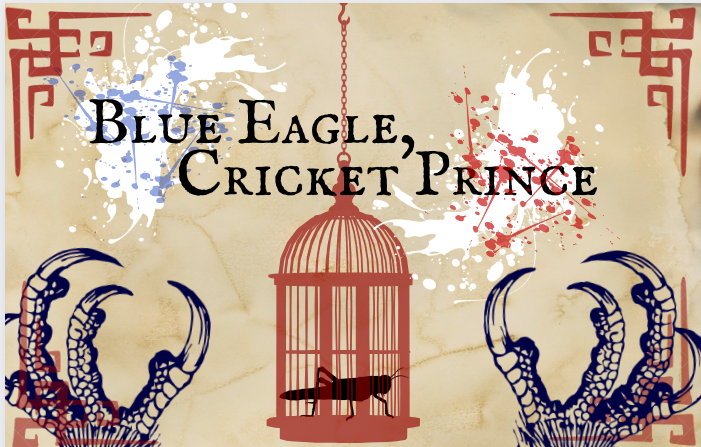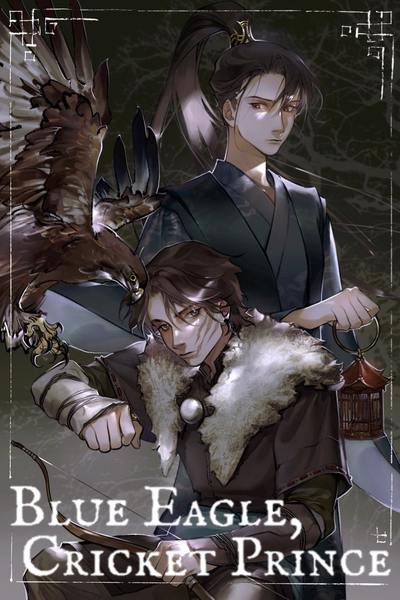He arrived at the pavilion Emperor Xian liked best in the central gardens about a half hour early, out of a lack of a better place to pass the time. Zhisen might have otherwise spent time poring over maps of the steppe, but after thinking over his plan last night, he decided it was better to conserve some energy for the journey.
The almond tree shed blossoms over the pond, and beneath it a few young women were feeding the family of swans with bread. Zhisen drank some tea, but did not realize that he was staring until one of the ladies met eyes with him. She looked surprised at first, pausing in her talking with her friend— but as her friend noticed and looked away from the swans in his direction, she flushed deeply and looked away again. Zhisen inclined his head when the other young woman caught sight of him, and she turned to her friend with laughter, saying something he could not hear at such a distance.
Zhisen was more interested in the birds.
The family of swans had three cygnets. The parents and two of the cygnets were happily indulging in the bread tossed to them by the young women, but the smallest one was some distance away, swimming among the lotus flowers. It was fascinated with them. Zhisen wondered if it would continue to adore the flowers without reason when it grew more. Why would any bird other than a sunbird care for a flower?
Well, Zhisen thought while he watched it splashing around, every family has a runt.
He was refilling his cup with tea— before the servant on standby could do it for him— when one of the adult swans swam over to the little one and tried to herd it toward the bread crumbs. Just as Zhisen was looking forward to see if the cygnet was determined enough about the flowers to make a fuss, he heard footsteps behind him, and then Emperor Xian's voice. “Zhisen, I heard you’ve been here for a while.”
Zhisen turned around where he was sitting and inclined his head. “Father. Thank you for coming.”
The Emperor chuckled and walked around the table. “I see you’ve set up the game already.”
“You mentioned that you wish to equalize our score,” Zhisen answered, turning to face the Go board once again. The servant who had been standing around was discreetly pouring tea for them both, while the Emperor sat down on the cushions on the other side of the table. He blocked the view of the almond tree and pond somewhat, but the pavilion was open on all sides. Zhisen noticed that the Emperor was somewhat focused on his neck, and remembered seeing the thin red line left behind. It was barely a string of scabs now, but Zhisen reassured him, “Do not worry, it was only a scratch.”
With one eyebrow raised, Emperor Xian asked him, “Do you prefer your sword scratched or not?”
“It depends on the depth of the scratch,” Zhisen said. “If it is not deep, the balance is unchanged.”
“No matter how shallow the scratch, the blade is closer than before to breaking.”
Zhisen chuckled. “This is when I gently remind you that I am a grown man, Father,” he said, with a smile, and drank some tea before Emperor Xian did. “Shall I play black?”
Emperor Xian pushed the bowl of white pieces toward him. “Choose one: either you are a grown man and a master of Go, or you are my little boy and the weaker player.”
“I’ll play white so that you have the chance to equalize the score.”
A competitive burst of laughter as he put down his first piece. “You’re full of cheek.”
Zhisen made his move. “Would you like me any other way?”
“No— if you were any bolder, I’d mistake you for your mother,” he said, shaking his head with a smile. His second move was as swift as the first, but Zhisen did not know which tactic he would employ.
“I meant, if you would like me less bold.” He set down another piece.
“I would like you less practical,” the Emperor said, and drank some tea while his gaze moved between the few pieces that populated the board and set up the strategy. “Less sharp-tongued. I would like it if you did not say such things as ‘it only takes one man to deliver a message,’ and yet have the tact to say it at the right time to persuade my entire court.” Zhisen smiled, entertained by the Emperor’s move and by his words. He set down his piece after a moment of deliberation. Emperor Xian drummed his fingers on the edge of the table and considered the board, then asked, “Why do you insist on going to the steppe alone?”
“Did I insist so strongly?”
Emperor Xian laughed heartily. “You threatened to give Gentry Su a beating.”
“I threatened exercise,” Zhisen corrected, trying not to smile too widely. “His gut is growing.”
“Oh!” The Emperor set down his next piece, brows raised. “You are magnanimous indeed.”
Zhisen couldn’t resist laughing at that, and said, “I inherited my generosity from you.” Emperor Xian shook his head and smiled as if to tell him he was being too silly. “But I mean as I spoke. In earnest, let us avoid this war if we can. I know that if we win, it will bring us great wealth and advantage— yet the odds are against us, and great loss is not something we can afford now or ever. At the very least, I would like to talk with them first. We might be able to come to an agreement.” He knew that the Emperor doubted it, so he added, “Even if we can’t— at least by showing that we are willing to make peace with them, we are reducing tensions, however minimal. As you said, no matter how shallow a scratch, it still brings the blade closer to breaking. If we can avoid this one scratch, we should do so.”
“I should shut my mouth and never give you more ammunition for your speeches,” the Emperor said with a sigh, making his next move, taking three of Zhisen’s pieces captive. Zhisen spent some time thinking of how to arrange his next string, but Emperor Xian asked him, “How are things with Feiyan?”
Zhisen paused and looked up. The Emperor was looking at him, not the board. He closed his fingers around the piece he had been on the verge of playing and offered a small smile. “Very well, of course.”
“Zhisen, for how long will you tell me that you are still enjoying the romance of your marriage?”
He tried not to wince. “Is there a reason for me to produce heirs at the moment? Junsai is the one who needs heirs, but Shengtong hasn’t borne him a single child.”
“Firstly, you both have equal need of heirs until I have decided the inheritance,” he said, setting down his cup. “And I’ve told you on several occasions that it is an even surer way to strengthen alliances with conquered provinces than marriage to your wife and concubines. What more reason do you need?”
Making a show of exasperation, Zhisen played his piece and shook his head. “Father, please. That’s so political of you. There are hundreds of reasons to want children, including the fact that they are cute.”
“And so you are in some sort of active effort to prevent children, why?”
Zhisen grinned. “If you become grandfather of my children, I cannot be both a grown man and your little boy at the same time, can I?” Emperor Xian looked surprised, and Zhisen laughed. “Your move.”
Emperor Xian made his move, then said, “Don’t try to appeal to my affection for you.”
“The three rhetorical appeals are to logic, morality, and emotion. Fault yourself for teaching me.”
“Perhaps I should. It seems self-destructive to have educated you so that you can grip my councilmen by their throats like geese to cook at your leisure,” he said, drinking more tea. Zhisen did not answer, and waited for the Emperor to put down another piece. He did so, adding, “On that subject, you were right about Lord Huang. He was redirecting tax to his coffers. But is that enough for you?”
Zhisen raised an eyebrow. “Is what enough for me? His execution? Well, that’s the law.”
Emperor Xian watched him making his move, then answered. “No, is it enough for you to weed out traitors in court and among the nobility? What is it you wish to do in the future?”
“If you’re asking me because you want me to say something that will make it easier for you to give Junsai the throne despite our close relationship, tell me so that I can say it properly. I’ve prepared several platitudes for your convenience, and memorized them, too,” Zhisen said cheerfully, and once again robbed the servant of his job by pouring tea for himself. He did think there were better uses for people within the palace walls than standing by to man teapots. “So? An answer to reveal my ignoble heart? Or stupidity?”
The Emperor looked at him in silence for a long, quiet moment. Then, he picked up his cup of tea and drank some while looking out at the garden. The birds chirped and the young women feeding the swans were chatting distantly. Eventually, Emperor Xian said, “You are right that it would be easier to put Junsai on the throne, but that is not because he is my eldest and most legitimate heir.”
Zhisen did not take the pause as an invitation to speak.
“You see, I know what Junsai will do with these lands. He will continue in conquest until we have reached the mountains in the west, the sea in the south, and the tundra in the north. Then he will stop. Or his son will stop. And then, our lineage will continue for a long time as it has done until now.”
“That is indeed how he would rule,” Zhisen agreed.
“But how would you rule?” He paused, and drank some more tea. Then: “I do not know.”
“Father, I have said before that I have no wish for the throne.”
Emperor Xian met his eyes. “Then what is it that you wish for? You do not wish for children. You do not wish for more women. You do not wish for more lands. You do not wish for a vaster empire. You do not wish for war, but you do not hesitate to contribute to Junsai’s battle plans. You do not wish for the throne, but you are holding the court in the palm of your hand. And do not tell me I am the master of the Imperial court, when you know enough to be the one informing me of traitors before even my own spies.” Zhisen drank more of the tea and avoided his gaze. “There must be something you want.”
“I want to support you until your final day, and then I want to help Junsai rule our lands wisely.”
A pause. “Are you implying that you wish to guide his hand?”
“Why would I do that?” Zhisen asked, baffled. “He knows how to rule this empire.”
“So, why would he need your help?”
Zhisen set down his cup. “Because we make a good team. He knows how to rule an empire, the loyalty of the army is his, and unlike me he is able to charm the nobility. I know how to clean a beautiful garden of blemishes, and I am able to persuade those who will not be charmed.” He paused and made the next move on the Go board. “Perhaps he does not ‘need’ me, but I believe that he ‘wants’ me. After all, who should an emperor trust? Only his mother— should she live until then— and his wife— should she love him faithfully. In an ordinary case I would say that an emperor should always trust his brother to wish him dead, but what I wish for is simple. I will repay you for being kind to my mother and me until I cannot repay you anymore. And I will repay Junsai for being my brother when I needed one.” Since the Emperor did not answer quickly enough, he added, finally, “A disquieted mind only breeds a disquieted life.”
“You do not need to tell me to trust you.”
“Is that because you trust me, or because you never will?”
Emperor Xian sighed. “You are my son.”
Zhisen chuckled and poured more tea for him. “You have sixteen sons.”
“Of course I trust you,” he said. “When have you ever given me a reason to doubt you? By now you could have overthrown me and taken the throne, but still you have not. So, why mistrust you?”
“I’m only teasing,” Zhisen said. “What reason have you ever given me to hate you?”
There was another pause, and Zhisen looked up from the board, which was so populated with pieces now that it might have given a less-seasoned player a headache. Emperor Xian's eyes were a bit softer than usual, so Zhisen braced himself for what he knew would be mentioned. “Your mother said the same thing to me once,” he said, looking down at the rippling surface of tea in his porcelain cup. “But I’m afraid that I could not tell her as I can tell you that I hope I never have given you such a reason.”
Zhisen did not have anything intelligent to say to him, and so said nothing.
Emperor Xian added, “You are my son— and I am glad for that, or else my court would think me strange to play Go and talk philosophy in my spare time with a daughter.”
“Do I resemble her that much?”
His eyes were sad, but he smiled faintly. “You do.”
They did not say anything else of particular import while they played, because Zhisen had nothing with which to answer him. It was strange to think that he was the spitting image of someone he could barely remember the face of, but someone he loved and resented with his whole heart. He did not want to think or talk about his mother. Every time he recalled a faded memory, he recalled how much he loved her— and inevitably, how much she saddened him. Zhisen did not wish to think of her. But his father would always.
Sure, he thought. Children are cute. But is a child with the face of your beloved a blessing, or a curse? Zhisen knew that if he asked Emperor Xian, he would say it was a blessing. But from where he was looking at his father, Zhisen figured it was more of a curse.
When they finished playing two hours later, and Zhisen won, the Emperor wished him safe travels.
Zhisen thanked him with a smile and headed toward Junsai’s quarters.













Comments (2)
See all